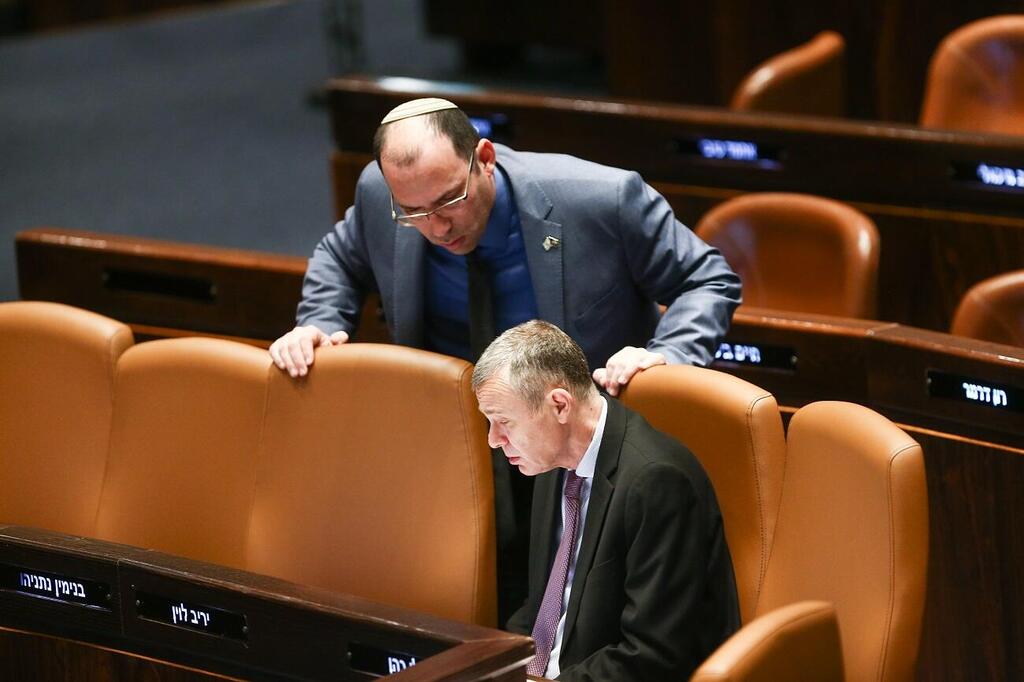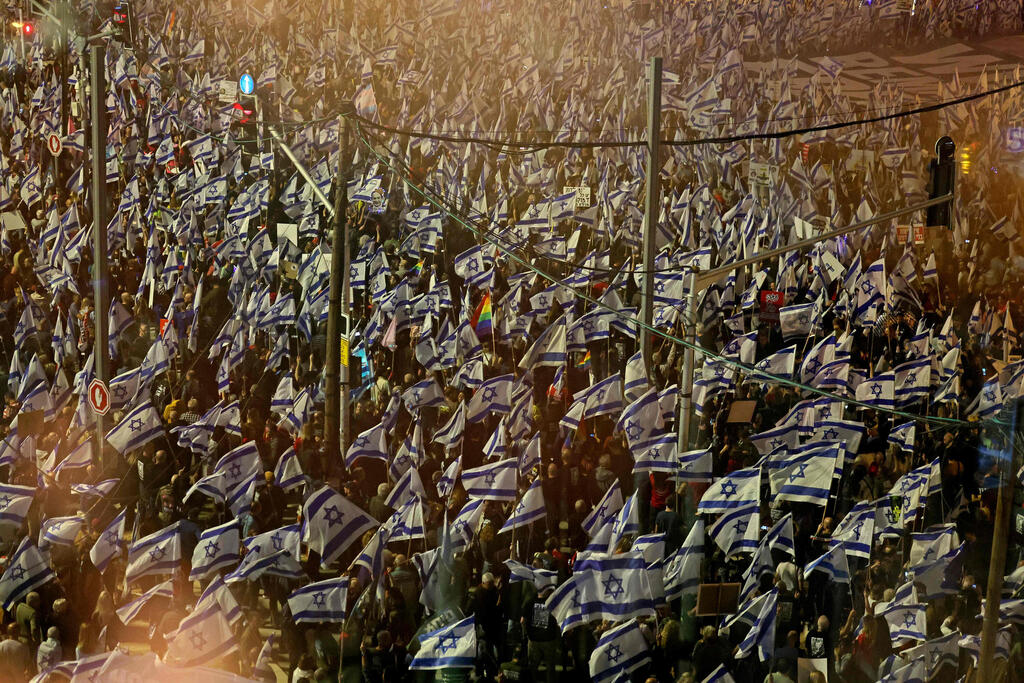Getting your Trinity Audio player ready...
Supporters of the judicial overhaul (they call it “the reform”) claim that in a democracy, the people are the sovereign, and therefore a majority in the Knesset is authorized to legislate however it sees fit.
Other stories:
Some of them know of “liberal democracy” with limits on the majority’s power, but argue “we are conservative democrats”, not liberals. The more knowledgeable among them offer an argument in support of their position; it is necessary to listen to them in order to realize how vacuous it is.
4 View gallery


Coalition leaders - Left: Itamar Ben-Gvir and Arye Deri; Center: Benjamin Netanyahu; Right: Bezalel Smotrich, Yitzhak Goldknopf
(Photo: Hadar Yoavian, Alex Kolomoisky, AFP, Noam Moshkovitz, Knesset
)
Here is the gist of their position. True, the premise of liberal democracy is individual freedom, which the citizens partly give up when they join in the Social Contract – yet their basic freedom is preserved and sets limits to the government’s authority.
We, however – they argue – have a different premise, national-collectivist, and thus the people’s will stands above individual freedom. Hence in a state that is not only democratic but also Jewish, the (Jewish) majority is authorized to legislate as it sees fit.
A court that seeks to set limits to this authority by virtue of the rights of individuals or minorities is, on their view, anti-democratic: “a dictatorship of the High Court of Justice”, as they call it.
This approach is immoral, at least under any humanistic conception of morality, since it subjugates human individuals to the nation, and all too easily leads to fascism like that of Franco, or at least Mussolini. But it is also not really Jewish.
Judaism has a venerable and impressive political tradition. The “negation of the Exile” touted by many of Zionism’s leaders ignored many things: one of them is the rich tradition of self-rule in Jewish communities, from the early Middle Ages to the onset of the modern era. This tradition flourished in parallel in Spain and in the Rhineland, North Africa and in Eastern Europe.
The Jewish community was mainly a local enterprise, and to a large extent was democratic – its laws, called takkanot, were adopted by majority vote (though the local rabbi sometimes retained veto power, insofar as it was granted to him by the townspeople).
In no place or time, however, was the majority granted unlimited power. The idea that the majority’s power extends to authority to pass a law that advances the interests of the majority group while abusing the minority – or even a single member – was decisively rejected.
Halakhic literature is replete with responsa penned by the greatest scholars, who received what were in effect appeals by an individual or by a minority group against oppressive legislation. The halakhic tradition clearly and consistently rejected the tyranny of the majority.
Of course, no right is absolute, and in some cases, individual rights must yield to a vital interest of the community. But this consideration does not provide a green light for each and every item of legislation supported by a majority of voters.
It is precisely for this that there is a need for a judicial institution that can steer and strike a balance: serving as a bastion against tyranny of the majority, while sometimes recognizing the supremacy of a communal interest over a particular right of an individual. That is what the great halakhists did throughout the centuries, and that is what the High Court of Justice does today.
The alarming notion that a majority in the Knesset should be able to legislate at will, subject to no review or limitation, would have given rise to fierce opposition by the great halakhists across the generations, from Rashba in Spain and Rabbenu Tam in France to Re'em in Constantinople and Rema in Poland.
Of course, in the past this function of a supreme court of adjudication was fulfilled by the scholars recognized as the leading sages of each generation. They functioned in effect like a High Court of Justice, a venue of appeal and adjudication above the local community and its leadership.
Hence it is perhaps no surprise that the current Chief Rabbi proposes “perhaps we should be above them” – that is, not the High Court of Justice but rather the Supreme Rabbinical Court will serve as the final arbiter, striking the proper balance between vital public interests and the rights of individuals and minorities.
It is worth emphasizing that even this view does not suggest granting unrestricted power to the Knesset, but rather proposes an alternative to the High Court of Justice, similar to the “Constitutional Court” put forward in some of the “compromise” schemes.
As an observant Jew who grew up within the ambit of halakha I can only respond sadly: Were it only that the rabbinical court would have accumulated a record and prestige that would confer a measure of plausibility upon this notion… In fact, however, in stark contrast to the great sages of earlier times, contemporary institutional rabbinic leadership has elected to position itself above all as a champion of the ideology and interests of a minority only.
(And in light of the plight of the women denied a get and chained to their husbands, one cannot but add: serving in effect as a male, patriarchal leadership).
Tyranny of the majority is an anti-Jewish idea, no less than its being anti-democratic. Perhaps there is an illiberal version of democracy – a Bolshevik “people’s democracy” or a Hungarian “national democracy”; but it is definitely not a Jewish democracy.
Nothing is more Jewish in Israeli democracy than the court’s power – and duty – to review the majority’s acts of legislation so as to protect the rights of individuals and of minorities.
The judicial overhaul, which seeks to entrench the tyranny of the majority, runs against the Declaration of Independence not only because the declaration promised equality and participation to all citizens of the state, but also because it promised to establish, in the Land of Israel – following the vision of the prophets – a Jewish state.
Should the overhaul, God forbid, succeed, that would constitute a betrayal of Zionism and a reneging of the Jewish tradition across the generations. As a democrat and a Jew, I believe and pray that this evil counsel be annulled and never be realized.
Prof. Noam Zohar teaches political philosophy and philosophy of halakha at Bar Ilan University. He is co-author of the book series The Jewish Political Tradition




